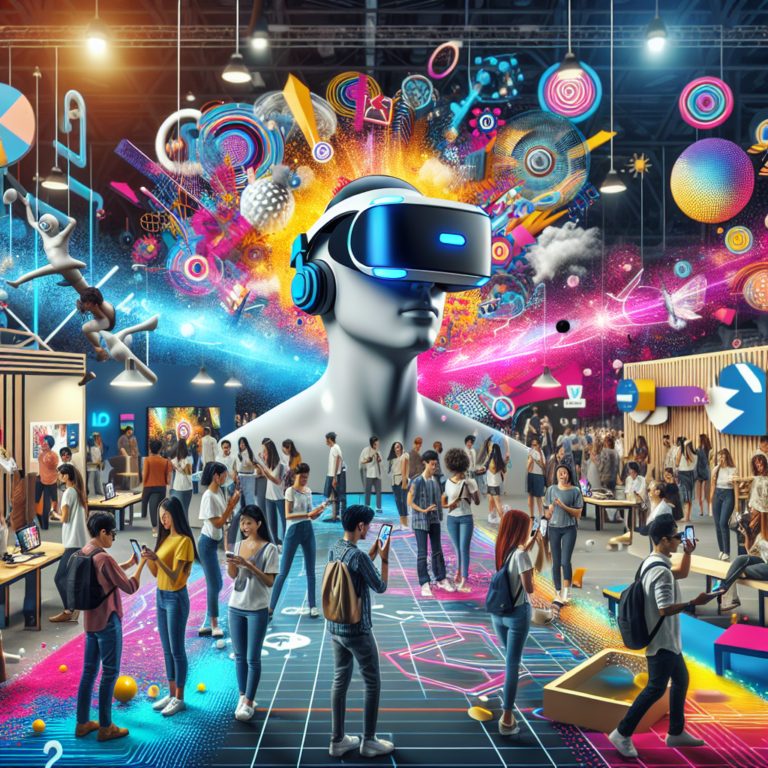Elevate Your Brand Engagement: How Experiential Marketing, AR, and VR Are Reshaping Customer Connections 🎉
The Experiential Revolution: Why It Matters for Your Brand
In today’s fast-paced digital landscape, experiential marketing has emerged as a pivotal strategy for brands aiming to create meaningful connections with consumers. This innovative approach goes beyond traditional advertising, allowing brands to engage with their audience in immersive and memorable ways. With technology advancing at lightning speed, brands that harness these experiences will undoubtedly stand out in the marketplace.
Keeping Pace with Technology: The Key to Captivating Consumers
To capture consumer attention, brands must stay ahead of the curve. The evolution of technology offers endless opportunities to enhance customer experiences. For instance, artificial intelligence (AI) is revolutionizing how brands interact with their customers. By analyzing data and tailoring messages, brands can now create a personalized experience that resonates with individual preferences.
The Power of AI in Experiential Marketing
- Chatbots and Virtual Assistants: These tools provide instant gratification, enhancing customer service while allowing staff to focus on more complex inquiries.
- Data Analytics: AI-driven insights enable brands to offer highly targeted marketing strategies, elevating engagement rates and customer satisfaction.
- Personalized Content: With the help of AI, brands can deliver messages tailored to the unique preferences of each consumer.
The Rise of Influencers and User-Generated Content
Social media influencers have become powerful partners for brands looking to extend their reach. They offer a unique way to connect with new audiences and boost brand awareness. In the age of authenticity, collaborating with influencers and leveraging user-generated content (UGC) can build trust and create a sense of belonging among consumers.
- User-Generated Content: UGC offers social proof, enhancing authenticity and engagement.
- Influencer Marketing: Harnessing the reach and credibility of influencers can amplify brand messages.
Interactive Content: Captivating Your Audience
In a significant shift towards engaging and entertaining consumers, interactive content like quizzes, games, and engaging videos are gaining popularity. These types of content not only draw attention but also foster a more dynamic relationship between brands and consumers.
Engagement through Immersive Virtual Experiences
As brands seek to improve brand sentiment and provide consumers with personalized retail experiences, immersive virtual branding experiences are becoming essential. Virtual reality (VR) technology enables brands to create unique environments that engage consumers, leaving a lasting impression. Companies like J.Crew and Laneige have utilized VR to celebrate their history and showcase products in innovative ways.
- VR Delivering Personalization: The ability of VR to provide personalized experiences at scale improves relevance and resonance, leading to higher conversion rates and brand affinity.
- Innovation in Retail Marketing: The paradigm shift in retail brand marketing brought about by VR opens up unprecedented opportunities for engagement and creativity.
Localized Marketing: Connecting with Communities
As brands continue to navigate the complex digital landscape, localized marketing emerges as a critical strategy for creating personalized connections with specific communities. By customizing marketing efforts to resonate with local demographics, brands can establish a stronger presence and cultivate customer loyalty.
- Benefits of Localized Marketing: Personalization improves marketing campaigns’ effectiveness and increases brand loyalty.
- Immersive Experiences in Local Markets: Utilizing technologies like virtual reality in the Metaverse offers a groundbreaking tool for brand engagement tailored to local audiences.
The Metaverse and Immersive Experiences: A New Era in Marketing
The Metaverse offers an expansive platform for brands to create immersive experiences that go beyond simple transactions. By embracing storytelling and brand exploration in virtual environments, brands can capture the imagination of consumers.
Why Your Brand Needs to Embrace the Metaverse
- Creative Opportunities: The Metaverse enables unique strategies for consumer engagement that transcend traditional boundaries.
- Expanding Reach: Immersive experiences allow brands to connect with global audiences in innovative, interactive ways.
The Future of Marketing: The Intersection of AI, AR, and VR
Looking ahead, the integration of artificial intelligence (AI), augmented reality (AR), and virtual reality (VR) in marketing holds immense potential. Together, these technologies are redefining how brands engage with consumers, creating connections that are deeper and more meaningful.
- AR Enhancing Customer Experience: Through augmented reality applications, customers can visualize products in their own environments, mitigating purchase uncertainty.
- Unique Campaigns Using VR: Brands like Nike have successfully launched virtual worlds to deepen customer engagement and brand storytelling.
Gamification: Turning Consumers into Brand Advocates
Incorporating gamification elements into marketing strategies, such as AR-based games and VR challenges, can turn consumers into active participants and advocates for your brand. These memorable experiences not only drive engagement but also foster social sharing amongst audiences.
Interactive Storytelling: A Game-Changer for Brand Engagement
Through engaging narratives within AR and VR environments, brands can effectively resonate with consumers on a personal level, enhancing their overall brand experience. This innovative approach allows brands to craft dynamic stories that captivate audiences.
Utilizing Social Media for Greater Brand Visibility
Leveraging AR filters and lenses on social media platforms can significantly enhance brand visibility and engagement as users interact with branded content in fun and shareable ways. This strategy taps into the social nature of digital sharing, driving buzz around brand initiatives.
User-Generated Content for Enhanced Community Engagement
Incorporating user-generated content (UGC) into AR and VR campaigns can deepen consumer engagement. By involving your audience in co-creating content, brands foster a sense of community and connection, leading to increased trustworthiness and loyalty.
Embrace Immersive Technologies for Tomorrow’s Marketing Landscape
For brands aiming to excel in this competitive space, embracing innovative technologies like AI, AR, and VR is crucial. These tools offer endless possibilities for creating captivating, personalized, and engaging customer experiences that not only meet but exceed evolving consumer expectations.
As the digital marketing landscape continues to evolve, brands must remain agile and open to new strategies that elevate customer experience and drive sustainable brand growth. The future of marketing is undoubtedly immersive, interactive, and creative, paving the way for deeper connections with consumers.




0 Comments